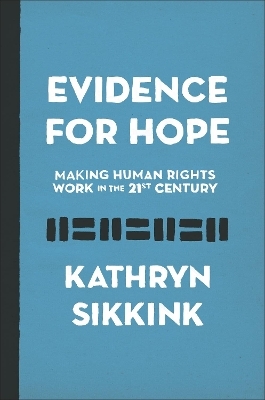
Evidence for Hope
Making Human Rights Work in the 21st Century
Seiten
2019
Princeton University Press (Verlag)
978-0-691-19271-0 (ISBN)
Princeton University Press (Verlag)
978-0-691-19271-0 (ISBN)
A history of the successes of the human rights movement and a case for why human rights workEvidence for Hope makes the case that yes, human rights work. Critics may counter that the movement is in serious jeopardy or even a questionable byproduct of Western imperialism. Guantanamo is still open and governments are cracking down on NGOs everywh
A history of the successes of the human rights movement and a case for why human rights work
Evidence for Hope makes the case that yes, human rights work. Critics may counter that the movement is in serious jeopardy or even a questionable byproduct of Western imperialism. Guantánamo is still open and governments are cracking down on NGOs everywhere. But human rights expert Kathryn Sikkink draws on decades of research and fieldwork to provide a rigorous rebuttal to doubts about human rights laws and institutions. Past and current trends indicate that in the long term, human rights movements have been vastly effective. Exploring the strategies that have led to real humanitarian gains since the middle of the twentieth century, Evidence for Hope looks at how essential advances can be sustained for decades to come.
A history of the successes of the human rights movement and a case for why human rights work
Evidence for Hope makes the case that yes, human rights work. Critics may counter that the movement is in serious jeopardy or even a questionable byproduct of Western imperialism. Guantánamo is still open and governments are cracking down on NGOs everywhere. But human rights expert Kathryn Sikkink draws on decades of research and fieldwork to provide a rigorous rebuttal to doubts about human rights laws and institutions. Past and current trends indicate that in the long term, human rights movements have been vastly effective. Exploring the strategies that have led to real humanitarian gains since the middle of the twentieth century, Evidence for Hope looks at how essential advances can be sustained for decades to come.
Kathryn Sikkink is the Ryan Family Professor of Human Rights Policy at the Harvard Kennedy School of Government, and the Carol K. Pforzheimer Professor at the Radcliffe Institute for Advanced Study. Her books include The Justice Cascade (Norton) and Activists beyond Borders.
| Erscheinungsdatum | 19.02.2019 |
|---|---|
| Reihe/Serie | Human Rights and Crimes against Humanity |
| Zusatzinfo | 24 b/w illus. 1 table. 1 map. |
| Verlagsort | New Jersey |
| Sprache | englisch |
| Maße | 156 x 235 mm |
| Themenwelt | Sachbuch/Ratgeber ► Geschichte / Politik ► Allgemeines / Lexika |
| Geisteswissenschaften ► Geschichte ► Allgemeine Geschichte | |
| Geschichte ► Teilgebiete der Geschichte ► Kulturgeschichte | |
| Sozialwissenschaften ► Politik / Verwaltung | |
| ISBN-10 | 0-691-19271-5 / 0691192715 |
| ISBN-13 | 978-0-691-19271-0 / 9780691192710 |
| Zustand | Neuware |
| Haben Sie eine Frage zum Produkt? |
Mehr entdecken
aus dem Bereich
aus dem Bereich
der stille Abschied vom bäuerlichen Leben in Deutschland
Buch | Hardcover (2023)
C.H.Beck (Verlag)
CHF 32,15
vom Mittelalter bis zur Gegenwart
Buch | Softcover (2024)
C.H.Beck (Verlag)
CHF 16,80


